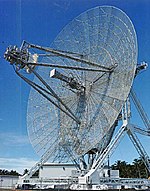Portal:Science/Featured article/17
RADAR is a system that uses radio waves to determine and map the location, direction, and/or speed of both moving and fixed objects such as aircraft, ships, motor vehicles, weather formations and terrain. A transmitter emits radio waves, which are reflected by the target and detected by a receiver, typically in the same location as the transmitter. Although the radio signal returned is usually very weak, radio signals can easily be amplified, so radar can detect objects at ranges where other emissions, such as sound or visible light, would be too weak to detect. Radar is used in many contexts, including meteorological detection of precipitation, air traffic control, police detection of speeding traffic, and by the military.
The term RADAR was coined in 1941 as an acronym for Radio Detection and Ranging. This acronym of American origin replaced the previously used British abbreviation RDF (Radio Direction Finding). The term has since entered the English language as a standard word, radar, losing the capitalization in the process.

